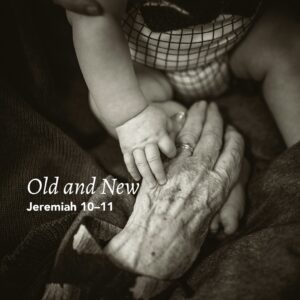Jeremiah 10-11: Old and New
October 5, 2024
TODAY'S BIBLE READING:
Jeremiah 10-11, Ecclesiastes 3:16-22, John 1:43-51, James 2:14-26

All true spirituality begins with an open ear to what God is saying. “Hear the word that the LORD speaks to you” (10:1). Are we listening to what God is saying? Are our ears attentive to the Scriptures? Do we set aside time not simply to skim across the surface, or learn a few Bible verses, or check a daily devotional time off our list of to-dos, but actually to listen to what God is saying to us through his Word? Many times it is surprising to people how often God’s Word does actually address the questions that they are facing in their daily lives. God’s Word is not simply an ancient word, it is also a contemporary word, a word that speaks today.
Israel, in particular, needed to “Learn not the way of the nations” (10:2), which meant not following their way of idolatry. Jeremiah now spends time exposing the foolishness of idolatry. It is not hard to do. Who would make an idol of his own image, and by his own hands, and then worship that idol as his god? Yet, that is precisely what many of us do still today—albeit in slightly less obvious ways. We build or buy the latest fancy gadget, a car or a phone, and we bow down before it, in the sense that we give it far more attention and importance than the immaterial and spiritual God whom we are meant to worship. Because we are beings of flesh, it is much easier for us to worship flesh than to worship God who is Spirit. We cannot see God, but we can see these material, sensual, concrete, physical idols around us. So we are drawn (like the pagans) to worship our idols of money or fashion or fame.
Meanwhile, Jeremiah again points out the foolishness of the pastors and Bible teachers of his age. “For the shepherds are stupid and do not inquire of the LORD” (10:21). If you are a spiritual leader, your first task is to ask God what he wants you to do and how he wants you to lead. You are not leading for yourself, you are merely an under-shepherd, and so you must know what the Chief Shepherd wants. Inquiring of God is different for us perhaps than it was for them with their “Urim and Thummim” (Ex. 28:30), but the principle is the same. We are to spend time in prayer, seated with the Bible open, talking to our heavenly Father, asking that as we offer our bodies as spiritual sacrifices and our minds are transformed by his Word, we might be able to discern his will for us and for the people we lead.
Chapter 11 tells of the covenant that God’s people had broken. God had brought them out of Egypt, they were then to listen to God’s Word and obey God, but they had not. Astonishingly, Jeremiah is even told not to pray for this people (11:14). What are we to think of this? Is there a time to stop praying for a recalcitrant rebel or for a troubling situation? Samuel promises to keep on praying for God’s people despite their sin (“Far be it from me that I should sin against the LORD by ceasing to pray for you,” 1 Samuel 12:23). And Jesus tells us that we are always to pray and not give up (Luke 18:1). We are to pray without ceasing (1 Thess. 5:17).
What then are we to make of this text in Jeremiah 11:14? Jesus himself prayed from the cross, “Father, forgive them, for they know not what they do” (Luke 23:34). Perhaps Jeremiah, in the intimate place of communion with God, senses the frustration (if we may use that word of the divine being) of God in relation to his people, the pain (remember it is for good reason that Jeremiah is called the “weeping prophet”), and therefore takes on that feeling—and it is that which is being echoed here rather than a strict injunction or principle that has constant application. There are times, it is true, to shake the dust off our sandals (Luke 9:5), as it were, and move on. Sometimes when a door is shut, there is a man of Macedonia (Acts 16:9) calling us to new vistas of spiritual fruitfulness.
Like many a prophet before and since, Jeremiah embodies a partial aspect of what will later and in one place only be fully fulfilled: “I was like a gentle lamb led to the slaughter” (11:19). Praise God there is a sacrifice for our sins, where Jesus was led like a lamb to the slaughter and paid the price that we deserved! And so a new covenant.
ABOUT THE AUTHOR
Josh Moody (Ph.D., University of Cambridge) is the senior pastor of College Church in Wheaton, IL., president and founder of God Centered Life Ministries, and author of several books including How the Bible Can Change Your Life and John 1-12 For You.
WANT MORE?
To receive God Centered Life devotionals directly in your inbox, as well as other resources, enter your email address in the form at the bottom of this page and click "subscribe."

